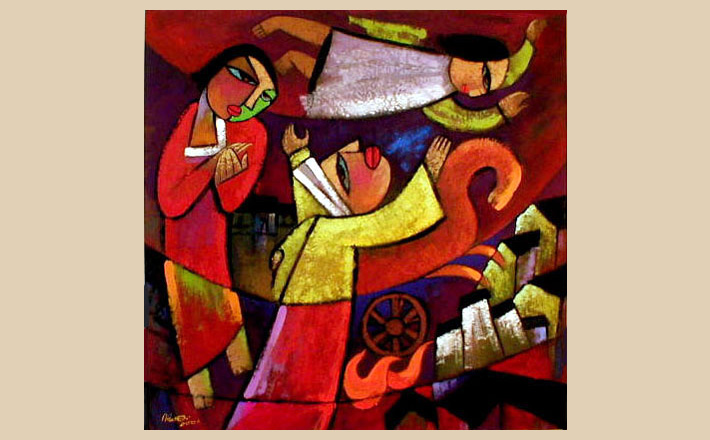Commentary on 2 Kings 2:1-2, 6-14
Transition is never easy.
Whether it’s from one generation to the next, from one president to the next, or from one pastor to the next, the transfer of leadership can produce tension and anxiety in any community. This was certainly the case with Elijah and Elisha and their prophetic community in 2 Kings 2. Today’s portion marks the conclusion of Elijah’s career, the point at which he must concede his power and position to his younger apprentice, Elisha.
Emerging in 9th century, in the wake of the division of the United Kingdom of Israel into two separate nations — Israel and Judah — Elijah and Elisha also mark a transition in Israelite prophecy. Unlike those before them who fulfilled prophetic responsibilities as part of their larger callings as leaders (i.e., Moses, Deborah, Samuel), Elijah and Elisha were called to be prophets in a new way.
They operated completely outside the system, with no official recognition or compensation. Much like the Blues Brothers, they were free agents who were “on a mission from God!” In 1 Kings 13–2 Kings 17, they marked out careers in which they performed miracles and healings and called Israel and its leaders to task, sometimes by violent means.
An Abrupt Transition
2 Kings 2 begins with no advance warning by announcing that the transition in prophetic leadership is imminent: “God was about to take Elijah up to heaven by a whirlwind” (2 Kings 2:1). The text almost seems to assume that we as readers were expecting this to come at some point, and shouldn’t really be surprised. But there really isn’t any narrative build-up to this moment. It comes out of left field, taking us by surprise.
Reading this text again, I began to wonder if I had missed something in all my earlier work with the Elijah-Elisha stories: When did God decide to take Elijah up into heaven? And why would God do so when Elijah was still presumably at the height of his career (and serving God did not generally involve early retirement)? In a broader sense, I wondered what this text communicates about transition in general.
A Day in the Life of Elijah
Elijah knew well that being a critic of the system was not for the faint of heart. The hostility between King Ahab of Israel (and his Queen Jezebel) and Elijah was deep and characterized by violence. In one of the best-known episodes in this relationship, Elijah issues a challenge to Ahab, telling him to assemble all of his idolatrous prophets on Mt. Carmel. Elijah intends to settle, once and for all, their disagreement over who speaks authentically for the divine (Yahweh in the case of Elijah, Baal and Asherah in the case of Ahab). At the end of the day, Elijah has scored a victory for God, but 850 prophets are dead. This event comes to characterize Elijah’s approach to his prophetic task — uncompromising and often brutal.
On the run from Ahab after his performance at Mt. Carmel, Elijah sums up his predicament, complaining, “I have been very zealous for the Lord, the God of hosts; for the Israelites have forsaken your covenant, thrown down your altars, and killed your prophets with the sword. I alone am left, and they are seeking my life, to take it away’” (1 Kings 19:9-10). A bit later on in this passage, God informs Elijah that there are in fact “seven thousand in Israel … that have not bowed to Baal,” and that maybe it’s time to identify a successor to the prophetic role (1 Kings 19:18, 16).
Too zealous?
The previously unknown Elisha doesn’t take over immediately, but instead begins to serve as a “prophet-in-training” and Elijah’s loyal companion. Rabbis in the Jewish interpretive tradition suggest that this transition is precipitated by Elijah’s excessive zeal. Using Moses as a point of comparison, in large part because of the many parallels between the two figures, Elijah comes up short.
The rabbis point out that Moses’ attitude toward the Israelites was characterized by his concern for the people — even when they turned away from God. Elijah, on the other hand, seemed more concerned with his own disappointments and frustrations than with the people involved. Even after a direct encounter with God in a cave at Mt. Horeb reminiscent of Moses’ own encounter there, Elijah’s vision never expands to that of an advocate for the Israelites. He remains their most determined judge.
So 2 Kings 2, according to the rabbinic tradition, offers a solution to prophetic zealotry: God simply removes Elijah from the scene in a chariot of fire, pulled by horses of fire. The rabbis go on to point out that while Elisha did not shy away from violence, his career was characterized instead by healings and miracles for the people.
Transition on the Ground: Elijah’s Anxiety
Once we learn that Elijah’s chariot is about to arrive, 2 Kings 2 describes a strange journey that Elijah intends to travel alone — from Gilgal to Bethel, on to Jericho, and then to the Jordan River. But Elisha refuses to leave his master until the last possible moment, traveling with him. At each point along the way, the two are met by a company of prophets, and at each point, Elijah tells Elisha not to continue on with him. Perhaps Elijah is hoping that if he just keeps moving he can postpone the inevitable transition. After all, someone who has been “zealous” for the Lord is not the type to throw in the towel easily, especially when his career is about to be cut short.
Elisha Takes his Master’s Place
Sometimes scholars suggest that it was Elisha who was afraid to let his master go, but it’s possible that there is more to it than that. Elisha is realizing that he will be left, but that no clear path of succession has been paved for him. Will all of these other prophets recognize his leadership, as the prophet among prophets? Perhaps with this in mind, he requests a double-portion of Elijah’s powerful spirit.
For an ancient audience, this corresponds to the inheritance due to the oldest son. Elisha, then, is not simply asking for “double the power” but also for an established position in Elijah’s prophetic legacy. Elijah tells Elisha that he is indeed asking a hard thing, but tells him “if you see me as I am being taken from you,” his request will be granted.
Elisha, in fact, witnesses his master’s departure and with his double portion, he picks up Elijah’s fallen mantle before the watching prophets on the other side of the Jordan, and splits the water in two. With this clear demonstration of his right as successor, Elisha crosses to take his place as the prophet among prophets in Elijah’s stead.


June 30, 2013